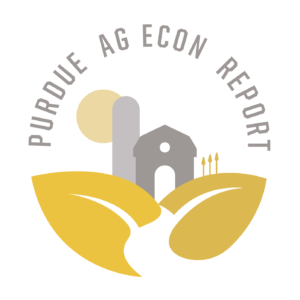Appreciating Chris Hurt’s Impact in Outlook and PAER
October 7, 2020
PAER-2020-17
Author: Ken Foster, Professor
Over the past four decades, it would be virtually impossible to interact with the Purdue Department of Agricultural Economics without meeting Dr. Chris Hurt. For many years, Chris was among the most quoted experts in the Purdue community. That’s saying a lot when one considers who the competition was over the past four decades and it speaks volumes to Chris’ passion for education and willingness to share his knowledge freely to anyone with interest.
Many years ago, I was a new assistant professor with a livestock Extension appointment but without much experience beyond 4-H. I felt like a ship destined to sink. Chris came to my office one day and said, “Swine Day is coming up soon, and we should write something for the annual publication.” Chris threw me a life preserver, and, like any lost and drowning soul, I clutched to it for all it was worth. Chris reeled in the line. Chris soon clued me in to similar opportunities with Beef Day, Dairy Day, and the annual state forage conference, each offering an opportunity to present to key livestock industry stakeholders and to write for a bulletin. Perhaps the most influential of these suggestions was when Chris introduced me to Purdue Ag Econ Report, suggesting that I should also be writing for our Ag Econ stakeholder audience.
In the mid-1990s, farmers across the state were dealing with changing marketing needs due to dramatic shifts in government programs and aggressive consolidation in the livestock industry. During this time, Chris found space in his busy schedule to take ownership of the fall issue of the Purdue Ag Econ Report. He marshaled colleagues, not just in Ag Econ but from across Purdue, to create a broad-based Agricultural Outlook program each year that blanketed the state through in-person presentations, webinars, and, of course, a popular issue of PAER. Chris’ enthusiasm for the Outlook issue of PAER was contagious and drove home the importance of engagement to many of us in the department and beyond.
Chris served on the editorial board of PAER for a number of years, watching the impact of the printed publication decline in an increasingly digital age. In 2014, Chris requested the job of PAER editor while I was the Ag Econ department head. Chris had a strong desire to reinvigorate and modernize PAER. During the next six years, Chris led a format redesign that gave PAER a strong digital presence on the web with easy to navigate links, often with supporting video and audio content. Stakeholders’ interest in the publication soared, as did faculty desire to provide content.
Chris has a keen understanding about the importance of audience. It’s a combination of “you can’t teach effectively if you don’t know who you are teaching” and “the best people to teach are the ones who are open to being taught at the time.” For economists, the latter usually means taking advantage of some sort of economic or financial stress or uncertainty. Under Chris’ leadership the scope of PAER broadened beyond the traditional farm production and marketing fare (he would still tell you that is the core audience) to include applied research directed at other interests such as health economics, family business and estate planning, demographic and environmental concerns, and others. This effort expanded the readership to better meet the informational needs of the department’s diverse stakeholders and to better reflect the impactful research across the department.
As many know, Chris retired last summer. We will miss having him around in the Krannert Building for many reasons – his economic insight, his wit, his wisdom, his support and encouragement of others. Chris’ legacy of translating applied research into information of value to members of the community will continue under new editorship. Chris’ leadership sets a high bar for the future of PAER and instills its importance in these new leaders. I expect that PAER will continue strong into the future. It’s a tribute to Chris’ innovation and impact on others that three of our productive, young professors have stepped forward to take leadership of PAER into the future. Thanks Chris! And happy retirement.
